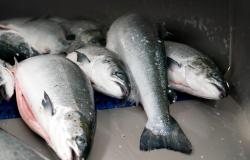Replacing more fossil fuels with biofuels is one of the measures that the environmental foundation Zero believes we should resort to in order to limit climate change. – It gets more difficult the longer we wait.
Less than 20 minutes ago
Transport manager Magnus Blom stands outside Posten’s head office at Lørenskog in Oslo.
The lorry behind him drives routes such as Oslo-Hamar without fossil fuel.
Since 2019, parts of Posten’s car fleet have run on something called advanced biofuel – it usually consists of food waste from Norway or slaughter waste from the USA.
It is a climate measure both the government and the environmental foundation Zero believe we should see more of in the future.
– I didn’t know what to expect. It’s different, says Blom about the first trip with biofuel five years ago.
At the start, there were several start-up problems with the new fuel, including engine stalling and difficulties starting the cars. But today Blom is exclusively positive. Although the cars are almost twice as expensive, he believes that electricity and biofuel are the fuel of the future.
– It is a process. And it has gotten much better. We need to get away from diesel.
As much as 30 percent of the car fleet at Posten in Oslo is currently powered by electricity or biofuel.
And there will be more of that.
Debated measure
Replacing fossil fuels with biofuels is an important but radical move, according to the recent annual report from the environmental foundation Zero. It can contribute to as much as 6 percent of the total emission cuts needed to reach Norway’s transition target for 2030, according to the report.
It is also one of the most debated measures: Some fear it could contribute to deforestation in other countries.
– Given that you can get hold of this in a sustainable way, it is better than fossil fuel. It cuts emissions, says Zero manager Sigrun Gjerløw Aasland.
To make biofuel, cultivated biomass is needed. What Norway uses as biofuel today is mostly slaughter waste from the USA. There may also be residues from agriculture and forestry such as wood chips, food scraps and vegetable oils.
Professor Vigdis Vandvik at the University of Bergen has warned that Norway is moving the climate problems to other parts of the world by increasing its use – this because biofuel can be very land-intensive.
Gjerløw Aasland emphasizes that biofuel should not be the strategy for all road traffic.
also read
The environmental movement reacts to climate action: – Highly debated
Harder and harder
But increasingly controversial measures will be required if we wait too long to introduce measures to limit climate change, Zero believes.
In the report “Every tonne counts”, measures such as increased use of biofuel, CO₂ capture directly from the air and scaling back of oil activity on the Norwegian continental shelf are highlighted as possible solutions if other emission cuts prove difficult.
Last year, the environmental foundation concluded that the job of reaching Norway’s climate goals was unlikely, but possible. A year later, the Zero manager admits that the job has become a lot more difficult.
– There is a big gap between what is happening now and what should be happening, says Aasland.
– It becomes more difficult the longer we wait, she says.
Now the foundation is proposing a number of new measures to more than halve Norwegian emissions.
This particularly includes increased efforts to cut large point emissions in industry, such as the power-intensive facilities of Hydro, Yara and Elkem, among others.
Among the concrete measures that Zero recommends are to ban fossil fuel burning and to add climate requirements to the so-called CO₂ compensation scheme.
In addition, emphasis has been placed on measures to cut emissions in heavy transport, construction sites and shipping.
Zero receives financial support from major industry players such as Hydro, Konsberg and Asko. They all support the foundation with around NOK 500,000 a year each.
Will require a lot of power
Most of the measures Zero recommends require new renewable power.
The proposals for Zero will require a total of 38 terawatt hours (TWh) of new renewable energy up to 2030. That’s a lot. The total electricity consumption in Norway is around 140 TWh annually.
In order to achieve this, Zero believes that politicians must increase their efforts to bring about more energy efficiency, network development and production.
– This is the really big political task, says Aasland in Zero.
A quarter of the electricity must be able to come from district heating and energy efficiency.
The offshore wind farm in Sørlige Nordsjø II, which it recently became known that the Dutch company Ventyr will develop, is also partly baked into the electricity calculation.
But it is solar power and wind power that must account for most of the new energy.
– We propose approximately as much wind power on land as has been built to date.
Zero believes it is realistic to achieve this due to new tax rules and stricter requirements for case processing.
– I think it will be easier to build now than several years ago. There are projects where the local population is positive, says the Zero manager.
Can collect money from tax
It will also cost.
The total price tag for all the measures Zero proposes is NOK 78 billion.
That is NOK 13 billion more than what Zero said it would cost last year.
– It is like that the longer we wait, the more expensive it will be, says Aasland.
The most expensive measures are to cut large emissions in industry. An extra pot for the maritime sector, on support for rebuilding ships and changing fuel, has also been added to this year’s calculation.
– I understand that this is a lot of money, but this is until 2030, and when the CO₂ tax is stepped up, the state will receive NOK 112 billion.
The Zero leader emphasizes that this presupposes the foundation’s proposed means of action.
The support for the government’s already announced projects, such as a ceiling of NOK 23 billion for the offshore wind project Sørlige Nordsjø II, and NOK 20 billion for the “Longship” project on carbon capture and storage, is not included in Zero’s calculation.
Zero has also proposed an increase in the CO₂ tax in the oil industry to speed up offshore wind. They believe that the oil companies must develop their own power at sea instead of electrifying the shelf with power from land.






